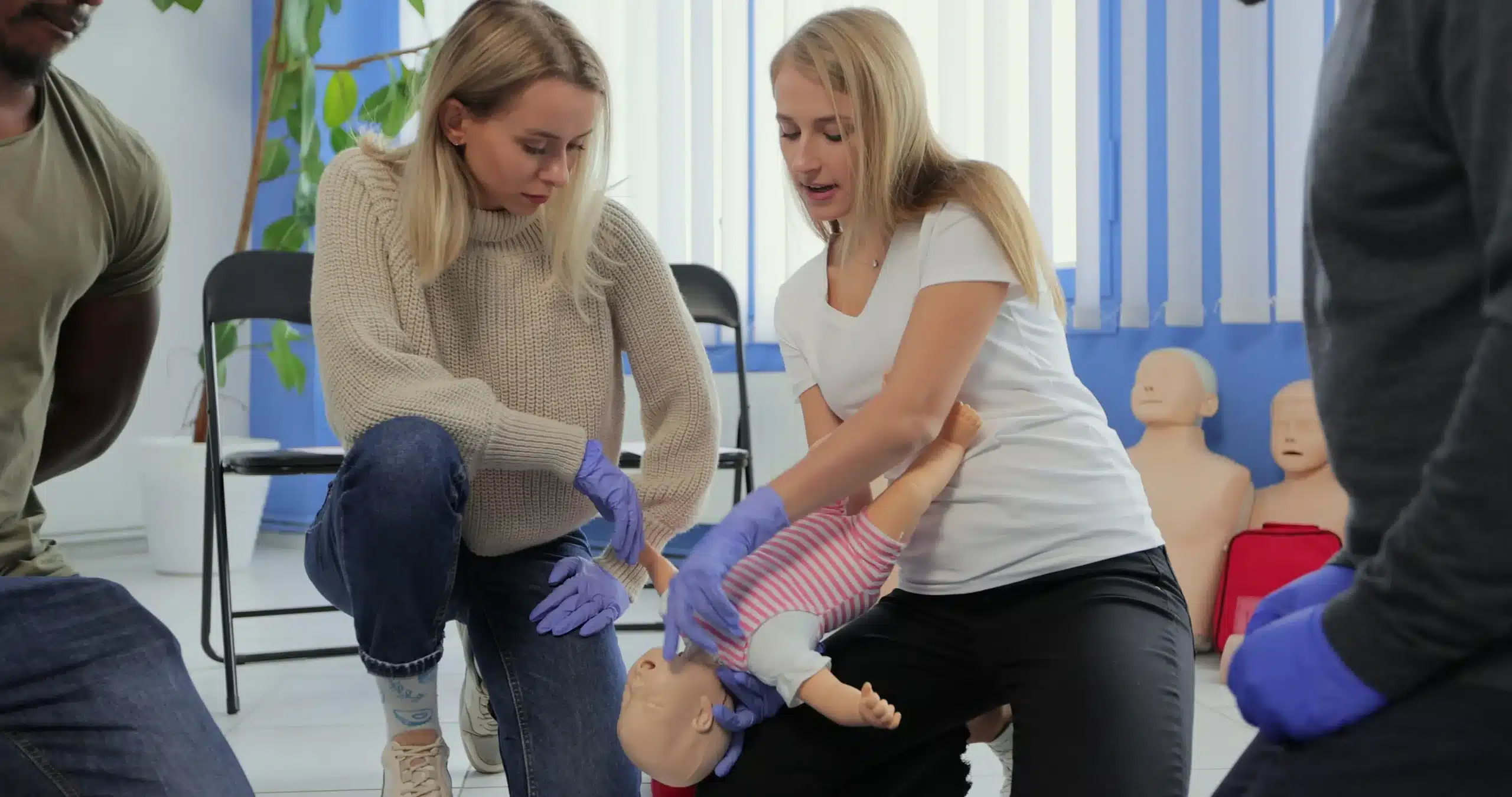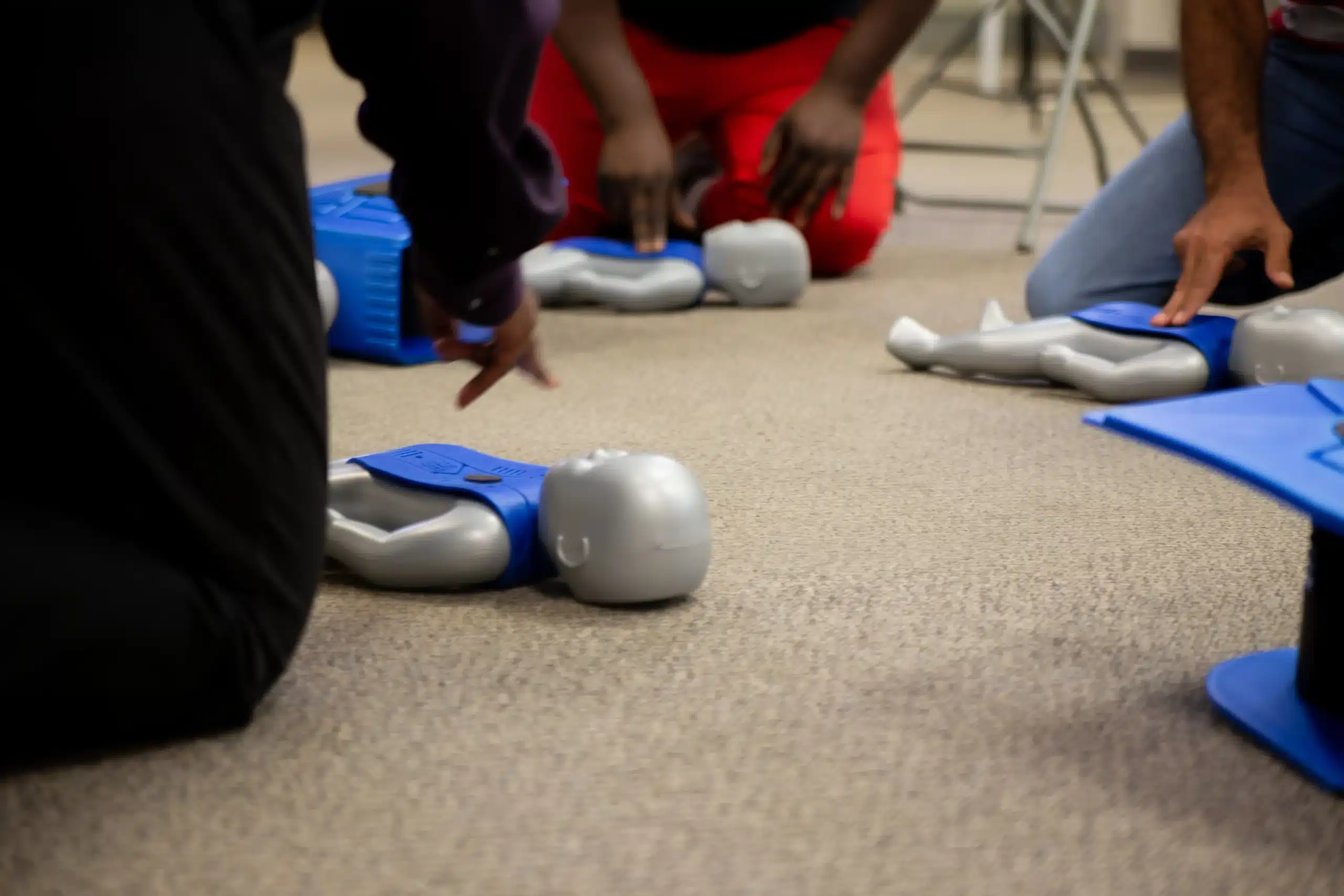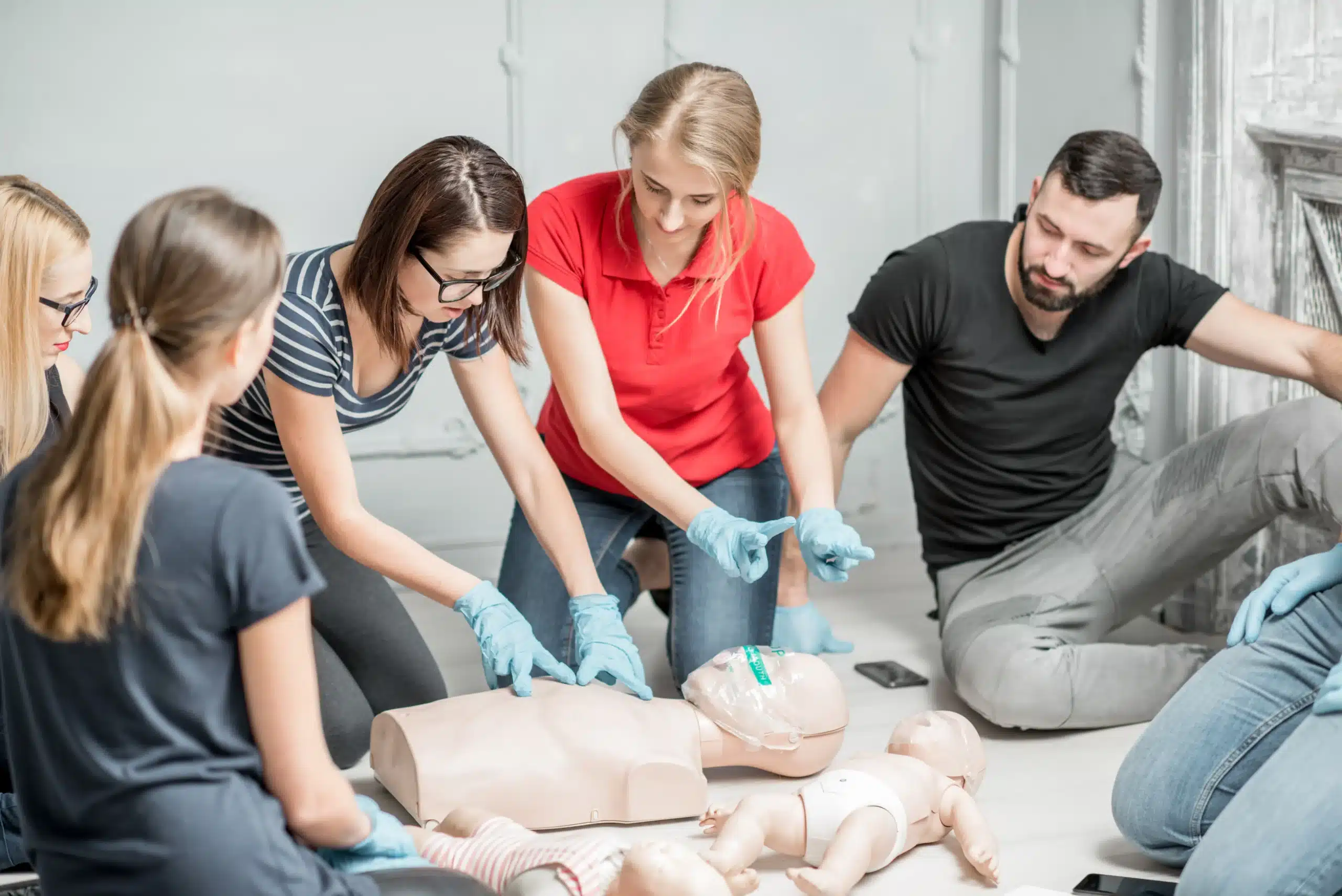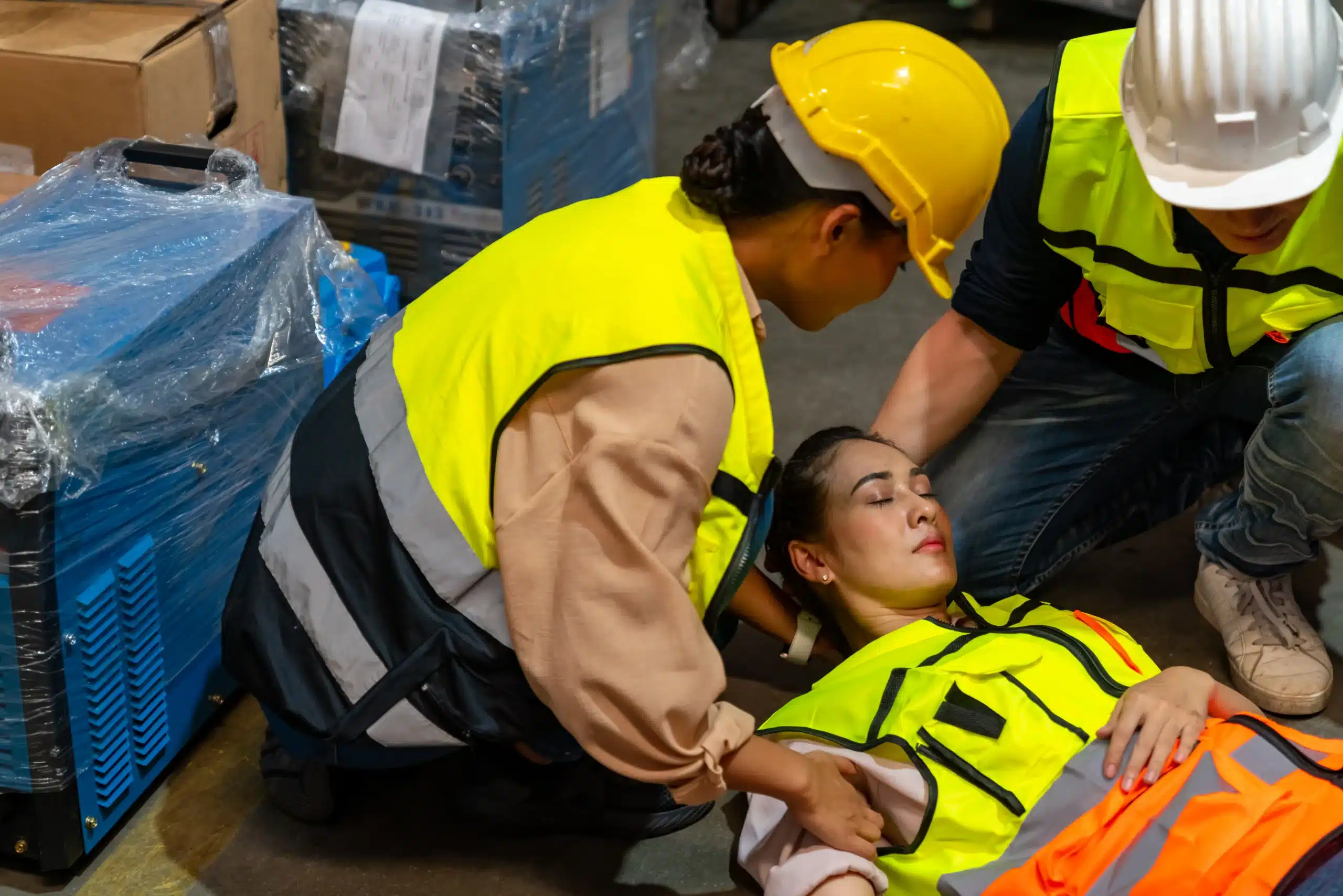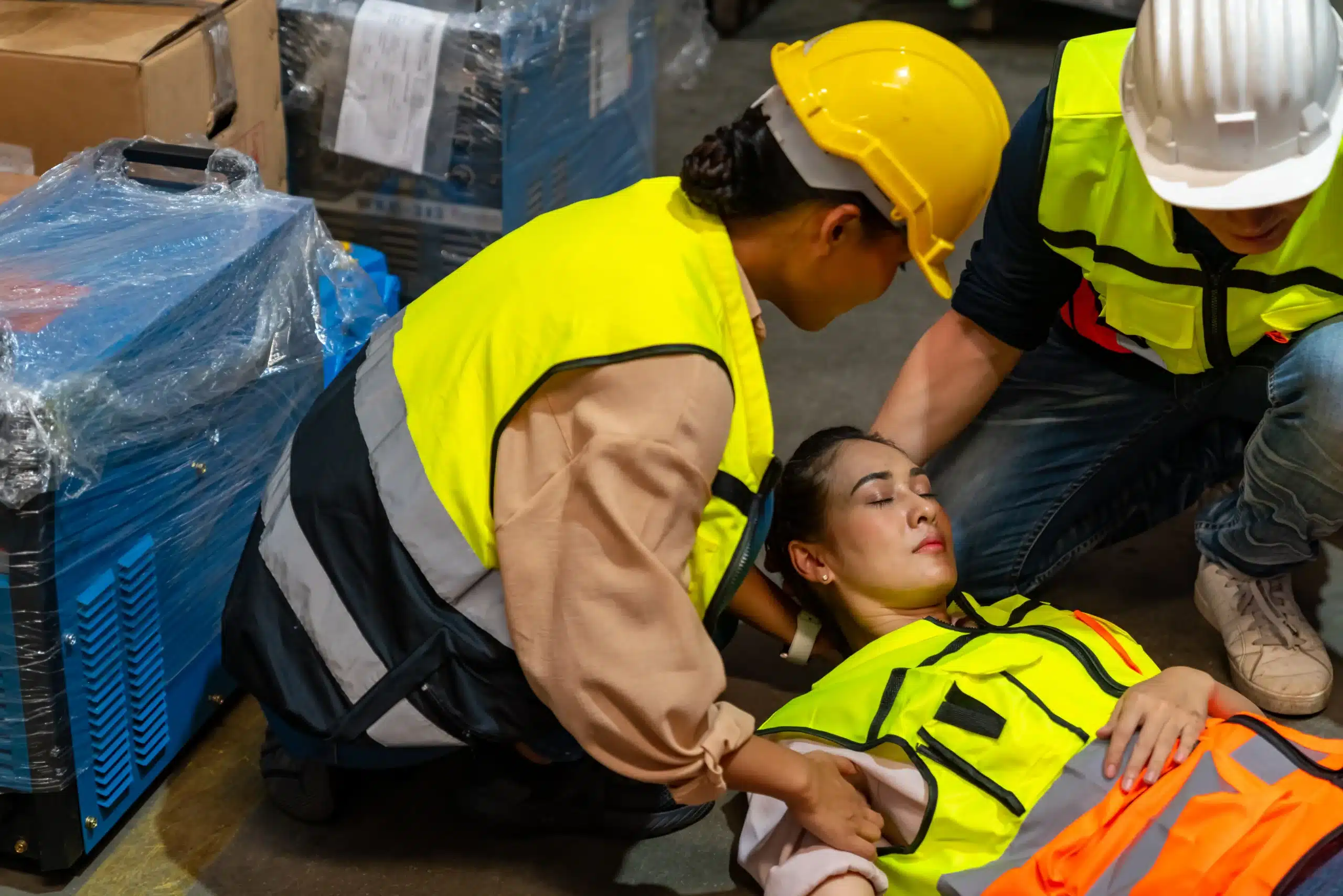Life is unpredictable, and emergencies can arise when we least expect them. Knowing CPR can empower you to act quickly and confidently in critical situations. Online CPR classes in Oakland offer a convenient and flexible way to gain this life-saving skill, fitting seamlessly into your busy lifestyle. This guide will walk you through the process of finding the right online CPR class in Oakland, covering everything from course content and reputable providers to certification options and cost considerations. We’ll also debunk common myths about online CPR training and provide valuable resources to support your learning journey.
Key Takeaways
- Online CPR training provides flexibility, but hands-on practice is crucial: Combine the convenience of online learning with the essential in-person skills sessions for a well-rounded and effective CPR certification.
- CPR certification benefits a wide range of individuals: Whether you’re a healthcare professional, childcare provider, parent, or simply want to be prepared, CPR training empowers you to respond confidently in emergencies.
- Choose your CPR course wisely and stay current: Research providers, compare offerings, and verify instructor credentials. Remember to recertify to maintain your skills and knowledge of the latest guidelines.
What are Online CPR Classes in Oakland?
Online CPR classes in Oakland offer a convenient way to learn life-saving skills without disrupting your busy schedule. These courses cover essential techniques like chest compressions, rescue breaths, and how to recognize the signs of a cardiac arrest. They’re designed for people with various skill levels, from complete beginners to healthcare providers seeking recertification. Many online CPR classes use videos, interactive exercises, and downloadable resources to make learning engaging and effective. While the online portion teaches the theoretical knowledge, most certifications require an in-person skills session where you demonstrate your proficiency. This blended learning approach combines the flexibility of online learning with the practical experience of hands-on training. Several organizations, including the American Red Cross, offer online CPR certification courses. If you’re looking for a local provider, CPR Certification Oakland offers American Heart Association (AHA) certified courses. You can also explore online options available through Berkeley CPR Classes for AHA-certified training. These courses provide a solid foundation in CPR techniques and can prepare you to respond confidently in emergencies.
Top Online CPR Class Providers in Oakland
Finding the right CPR class can feel overwhelming, so we’ve compiled a list of reputable providers offering online and blended learning options in Oakland. Remember that blended learning, which combines online coursework with in-person skills practice, is typically required for full CPR certification.
American Red Cross
The Red Cross offers CPR classes and certification in Oakland. Known for their comprehensive training, they provide a range of courses, some of which have online components. Be sure to check their website for specific courses available online and in person.
CPR Certification Oakland
CPR Certification Oakland provides American Heart Association (AHA) certified CPR and First Aid classes. They offer various options in Oakland and other Bay Area locations, including on-site training for groups.
Berkeley CPR Classes
If you’re near Berkeley, Berkeley CPR Classes offers AHA-certified courses convenient for those in Alameda, Oakland, and Berkeley. They provide blended learning options, allowing you to complete the online portion before attending an in-person skills session.
Other Local Providers
You can find several other organizations offering CPR training in and around Oakland. For example, Safety Training Seminars provides AHA-certified BLS, ACLS, PALS, and CPR classes. Researching and comparing various providers is always recommended to find the best fit for your schedule and learning style.
What to Expect from Online CPR Courses
Online CPR courses offer a convenient way to learn this life-saving skill. They blend online learning with practical exercises, ensuring you gain both theoretical knowledge and the confidence to act in an emergency. Here’s what you can typically expect:
Course Format and Structure
Online CPR courses usually follow a structured approach. Expect video lectures demonstrating proper techniques, interactive quizzes to test your understanding, and downloadable study materials for review. Many courses, like those offered at Berkeley CPR Classes, are certified by reputable organizations such as the American Heart Association (AHA), ensuring the training meets industry standards. For more information, check out our CPR training guide.
Duration and Flexibility
One of the biggest advantages of online CPR training is the flexibility. You can complete the coursework at your own pace, fitting it around your schedule. Most online portions can be finished in a few hours. We offer various certifications, from basic CPR to more advanced certifications like ACLS, to meet your specific needs.
Blended Learning Options
Many online CPR courses, including ours, use a blended learning model. This means you’ll complete the online portion, covering the theory and knowledge, and then attend an in-person skills session. This hands-on component allows you to practice techniques like chest compressions and AED use under the guidance of a certified instructor. Our ACLS HeartCode guide provides further details on this blended approach.
Hands-On Skills Assessment
While the online portion provides essential knowledge, a hands-on skills assessment is crucial for certification. This in-person evaluation typically follows the online modules. You’ll demonstrate your learned skills, ensuring you can perform CPR effectively in real-life situations. This combination of online learning and practical application provides a well-rounded learning experience, preparing you to respond confidently in an emergency. For the best value on comprehensive CPR training, check out our low price guarantee.
Costs of Online CPR Classes in Oakland
CPR certification costs in Oakland vary based on several factors, including the type of course, the certifying organization, and whether you choose online, blended learning, or in-person training. Understanding these factors will help you find a course that fits your budget and learning style.
Price Ranges for Different Course Types
Online CPR classes generally offer different price points depending on the certification level. Basic Life Support (BLS certification) is a common requirement for healthcare providers and often ranges from $65 to $90. CPR and First Aid combination courses usually cost a bit more, typically between $85 and $110. More specialized certifications like Advanced Cardiovascular Life Support (ACLS) or Pediatric Advanced Life Support (PALS) are priced higher due to the advanced training involved. For those interested in further certifications, exploring RQI classes might also be beneficial.
Additional Fees
While the advertised price usually covers the core curriculum, watch for potential extra fees. Some providers might charge separately for study materials, online access codes, or certification processing. Carefully review the course details or contact the provider directly to understand the total cost before you register.
Discounts and Package Deals
Many CPR training providers offer discounts for group registrations, a smart choice for workplaces or community groups. Berkeley CPR Classes, for example, offers a low price guarantee and package deals that combine multiple certifications or include renewal courses at a reduced rate. Always check for these opportunities to save on your training.
Certifications and Recognition
Choosing the right CPR certification is essential. Let’s explore the options available in Oakland and what employers look for.
Available Certifications
In Oakland, you’ll find CPR certifications from reputable organizations like the American Red Cross and the American Heart Association (AHA). The Red Cross offers various CPR and first aid certifications, with courses designed to be accessible for beginners and taught by qualified instructors. The AHA also provides highly regarded certifications, often the preferred choice in healthcare. You can find AHA-certified courses through providers like CPR Certification Oakland, which specializes in AHA training. Berkeley CPR Classes offers a comprehensive range of AHA certifications, including BLS, ACLS, PALS, and more. This variety allows you to select the certification that best suits your career path.
Employer Recognition and Validity
A recognized and trusted certification is key. Both Red Cross and AHA certifications are widely accepted across various industries. If you’re pursuing a healthcare career, an AHA certification, like those from CPR Certification Oakland, is generally the standard. For many other professions, a Red Cross certification is equally suitable. If you’re unsure, check with potential employers about their specific requirements.
Renewal and Recertification
CPR certifications are typically valid for two years. Staying up-to-date with your training is vital, particularly in healthcare and related fields. Both the Red Cross and CPR Certification Oakland offer recertification courses, so renewing your credentials and maintaining your skills is straightforward. Remember to plan and register for a refresher course before your certification expires.
Benefits of Online CPR Training
Online CPR training offers several advantages, making it a popular choice for many people seeking certification. Let’s explore some key benefits:
Flexibility and Accessibility
Juggling work, family, and other commitments can make it tough to fit in traditional CPR classes. Online CPR training offers the flexibility to learn at your own pace, whenever and wherever it’s convenient. Whether you’re a busy parent, a healthcare professional with a demanding schedule, or someone who prefers learning from home, online courses provide accessible CPR training that fits your lifestyle. Berkeley CPR Classes understands this need and offers various course formats and group discounts to make getting certified easier.
Cost-Effectiveness
Online CPR classes are often more affordable than in-person options. This is because online providers have lower overhead costs, which they can pass on to students. Plus, you’ll save on travel expenses and time off work. Berkeley CPR Classes offers a low price guarantee, ensuring you get the best value for your training. Whether you need basic life support (BLS) certification or advanced cardiovascular life support (ACLS) training, you can find a cost-effective option that meets your needs and budget. Explore their BLS and ACLS course options for more details.
Expert Instruction
Just because you’re learning online doesn’t mean you’ll miss out on expert instruction. Reputable online CPR courses, like those offered by Berkeley CPR Classes, are developed and taught by experienced, certified instructors. Many courses, including those from Berkeley CPR Classes, lead to official American Heart Association certification cards, valid for two years, preparing you to handle emergencies confidently. You’ll receive the same high-quality instruction as in-person classes, ensuring you’re well-prepared to respond effectively.
Access to Resources
Online CPR training often comes with additional resources to enhance your learning. This might include downloadable study materials, interactive simulations, and access to online communities where you can connect with other students and instructors. Organizations like the Red Cross also offer various resources and training programs, including options for schools and organizations. Having these resources readily available can help you master the material and feel prepared for real-life situations.
Common Misconceptions About Online CPR Classes
It’s easy to get confused by the various CPR class options, especially with the rise of online courses. Let’s clear up some common misconceptions about online CPR training.
Online Training Effectiveness
One common misconception is that online CPR training is just as effective as in-person training. While online courses offer a convenient way to learn the basics, they often lack the hands-on element crucial for mastering CPR. Think of it like learning to ride a bike—you can read all about it, but you won’t truly learn until you actually hop on and pedal. Similarly, practicing compressions and rescue breaths on a manikin is essential for developing the muscle memory and confidence needed to perform CPR effectively in a real-life emergency. The Australian Training Institute discusses the importance of hands-on training when addressing common CPR myths.
Certification Legitimacy
Another misconception revolves around certification. Some believe that online CPR certifications aren’t legitimate or recognized by employers. This isn’t necessarily true. Many reputable organizations, including the American Heart Association and the American Red Cross, offer online CPR courses that lead to valid certifications. However, it’s crucial to choose a course from a recognized provider to ensure your certification meets the required standards. The CPR and BLS Training Institute debunks several CPR myths, including those surrounding certification legitimacy. Before signing up, verify the legitimacy of the certifying organization and whether it aligns with your workplace requirements. Our BLS course is American Heart Association certified, ensuring your certification is widely accepted.
Hands-On Practice
Perhaps the biggest misconception about online CPR classes is that they eliminate the need for hands-on practice. While the online portion covers essential theory and demonstrations, it’s simply not a replacement for physical practice. MyCPR NOW emphasizes the importance of hands-on training in their blog post addressing CPR misconceptions. Most reputable online CPR courses incorporate a blended learning approach, requiring students to complete an in-person skills session with a certified instructor after finishing the online modules. This blended format allows you to learn at your own pace online and then demonstrate your skills in a real-world setting. For those seeking group discounts, our group CPR discounts page offers more information.
Course Rigor and Duration
Finally, some assume that CPR certification lasts forever. Unfortunately, this isn’t the case. CPR guidelines and best practices are regularly updated, and skills can deteriorate over time. Most certifications are valid for two years, after which you’ll need to take a refresher course. The American Red Cross offers CPR classes in Berkeley, providing convenient options for renewal. Regular practice and recertification ensure your skills remain sharp and you’re prepared to respond effectively in an emergency. Check out our RQI classes for convenient refresher options. We also offer a low price guarantee, ensuring you get the best value for your training.
Choose the Right Online CPR Class
Finding the right online CPR class takes a little research, but it’s worth the effort. Consider these key factors to make an informed decision.
Factors to Consider
CPR training is for everyone. First, consider your specific needs. Are you a healthcare provider needing an advanced certification like ACLS? Or are you a parent looking for basic life support skills for everyday emergencies? Finding a course that matches your requirements is key. Most courses, including those from Berkeley CPR Classes, result in official American Heart Association certification cards, valid for two years, preparing you to handle emergencies.
Compare Providers
Next, compare different providers. Look at what each course includes, such as the format, online resources, and instructor support. For those in Alameda, Oakland, or Berkeley, Berkeley CPR Classes offers AHA-certified ACLS courses in nearby Berkeley. The widespread availability of CPR and first-aid classes in Berkeley reflects the community’s focus on safety and preparedness. Reading reviews from other students can also be helpful.
Instructor Credentials
Finally, research the instructors’ credentials. Are they certified by a reputable organization like the American Heart Association? Berkeley CPR Classes offers a variety of AHA-certified courses, ensuring high-quality training. The Red Cross also provides training in the area, with programs for individuals, first responders, organizations, and even schools. Experienced, qualified instructors will give you confidence in your training.
Who Needs CPR Certification in Oakland?
Knowing CPR can make a real difference in a critical situation. While it’s a valuable skill for anyone, certain professions and individuals benefit significantly from this life-saving knowledge. Let’s explore who needs CPR certification in Oakland.
Healthcare Professionals
For healthcare professionals in Oakland, CPR certification is often a job requirement. Doctors, nurses, EMTs, and other healthcare providers regularly face situations where CPR is necessary. These professionals need to maintain their skills and knowledge to respond effectively to medical emergencies. Regular CPR training ensures they can deliver high-quality care and potentially save lives. You can find more information on BLS certification through the American Heart Association.
Childcare Providers and Educators
Working with children carries significant responsibility, and being prepared for emergencies is paramount. Childcare providers, teachers, and other educators in Oakland should be equipped to handle medical situations, including breathing emergencies or cardiac arrest. CPR certification gives these professionals the skills to respond quickly and confidently if a child in their care experiences a medical crisis. CPR training is available for everyone, from basic life support to advanced certifications.
Fitness Instructors and Coaches
Fitness instructors and coaches often work with individuals pushing their physical limits. In these settings, medical emergencies, while rare, can occur. CPR certification allows fitness professionals to respond swiftly and appropriately if a client experiences a sudden cardiac event or other medical issue. CPR and AED certification courses, offered through organizations like the Red Cross and Berkeley CPR Classes, cover these essential life-saving skills.
Parents and Caregivers
While not always a requirement, CPR certification is highly recommended for parents, grandparents, nannies, and other caregivers. Knowing CPR can empower you to act quickly in a home emergency involving a child or loved one. From choking incidents to unexpected accidents, having CPR skills can provide peace of mind and potentially save a life. Many hospitals and medical centers offer CPR training and certification courses, often leading to American Heart Association certification. Consider taking a class to be prepared for any situation. Group discounts are often available, making it more affordable for families to learn together.
Additional CPR Training Resources
This section offers supplemental information and resources to enhance your CPR training journey.
Online CPR Class FAQs
Are online CPR certifications accepted in California?
Yes, online CPR certifications are accepted in California, provided they meet the requirements established by recognized organizations like the American Heart Association and the American Red Cross. Choosing a program that includes a hands-on skills assessment is essential to ensure you meet all California requirements. Learn more about
How does the blended learning format work?
Many online CPR courses use a blended learning approach, combining online learning with in-person skills practice. You’ll typically complete the knowledge portion online at your own pace and then schedule a shorter in-person session for a hands-on skills check. This blended format offers scheduling flexibility and often results in shorter class times. While online certifications are generally valid, it’s always a good idea to double-check with your employer or licensing board to confirm their specific requirements, as they can vary.
Continuing Education Opportunities
CPR is a lifesaving skill requiring ongoing practice and updated knowledge. The Red Cross strongly advocates for continuous skill development and offers various resources. Recertification courses are readily available, making maintaining your skills and staying current with the latest guidelines easy. You can also explore additional training, such as advanced CPR techniques or specialized certifications, through providers like CPR Certification Oakland.
Stay Updated with Latest Guidelines
Staying informed on the latest CPR guidelines is crucial for providing effective care. Organizations like the Red Cross have a Scientific Advisory Council that regularly reviews and updates their curriculum. For example, recent guidelines from the American Heart Association emphasize compression-only CPR as the preferred method for untrained bystanders. The CPR and BLS Training Institute explains that CPR, encompassing chest compressions and rescue breaths, doesn’t require extensive medical training. Staying updated ensures you’re prepared to respond confidently and effectively in an emergency.
Related Articles
- ACLS HeartCode Oakland: Your Certification Guide – Berkeley CPR Classes
- Berkeley CPR Classes: Your Complete Guide – Berkeley CPR Classes
- CPR Training in Berkeley: Your Guide – Berkeley CPR Classes
- Why CPR is Vital in Healthcare
- Life-Saving Workplace CPR and First-aid Training Benefits
Frequently Asked Questions
Is online CPR certification enough, or do I need in-person training too?
While online CPR courses offer a convenient way to learn the basics, most certifications require an in-person skills session. This hands-on component allows you to practice on a manikin and demonstrate your proficiency to a certified instructor. This blended learning approach combines the flexibility of online learning with the practical experience of hands-on training, ensuring you’re fully prepared for real-life scenarios.
How much do CPR classes cost in Oakland?
The cost of CPR classes in Oakland varies depending on the provider, the type of certification (BLS, ACLS, etc.), and whether you choose online, blended learning, or in-person training. Generally, you can expect to pay between $65 and $110 for basic CPR and First Aid certification. More specialized certifications like ACLS and PALS typically cost more. Look for providers offering discounts, especially for group registrations.
Which CPR certification is best?
Both American Red Cross and American Heart Association (AHA) certifications are widely accepted. If you’re going into healthcare, an AHA certification is often preferred. For most other professions, either certification is usually fine. Check with potential employers or licensing boards to confirm their specific requirements.
How long is CPR certification valid, and how do I renew it?
Most CPR certifications are valid for two years. To renew, you’ll need to take a recertification course before your current certification expires. Many providers offer renewal courses, often combining online learning with a shorter in-person skills check. Staying current with your certification ensures your skills are up-to-date.
What if I’m nervous about performing CPR in a real emergency?
It’s completely normal to feel apprehensive about using CPR in a real-life situation. That’s why proper training, including hands-on practice, is so important. Building muscle memory and practicing the steps in a controlled environment helps boost your confidence. Remember, even basic CPR can significantly improve someone’s chances of survival until professional help arrives.


